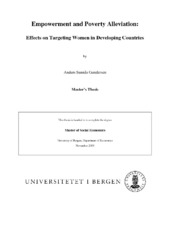Empowerment and Poverty Alleviation: Effects on Targeting Women in Developing Countries
Master thesis
Permanent lenke
https://hdl.handle.net/1956/3761Utgivelsesdato
2009-12-01Metadata
Vis full innførselSamlinger
- Department of Economics [289]
Sammendrag
In this thesis I assess the problems and solutions microfinance institutions face when entering a rural credit market characterized by information asymmetry and low degree of enforcement possibilities. Bangladesh and the Grameen type of microcredit are used as examples when describing how solutions have been applied. Standard theoretical models on adverse selection and moral hazard are assessed in order to give an understanding on how microfinance institutions have been addressing the various challenges when designing credit contracts in developing countries. A problem that has not yet been properly assessed in available literature is how householdsmake the decision to obtain credit. I show that under certain assumptions the applied separatespheres bargaining model explains why women may be kept out of the credit market by theirhusband. This has policy implications that challenge the contract design used by the GrameenBank and many other microfinance institutions. Discussions on microfinance outreach have toconsider intra household decision making in order to reach their dual goal of alleviating poverty and empowering women. The applied model shows that an inflexible approach towards targeting women may lead to a situation where women are kept out of the market for microcredit.
Utgiver
The University of BergenOpphavsrett
The authorCopyright the author. All rights reserved
